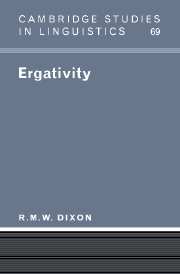Book contents
- Frontmatter
- Contents
- Preface
- Acknowledgements
- Appeal
- List of abbreviations
- 1 Introduction
- 2 Syntactically based and semantically based marking
- 3 Intra-clausal or morphological ergativity
- 4 Types of split system
- 5 The category of ‘subject’
- 6 Inter-clausal or syntactic ergativity
- 7 Language change
- 8 The rationale for ergativity
- Appendix: A note on theoretical models
- References
- Index of authors
- Index of languages and language families
- Subject index
1 - Introduction
Published online by Cambridge University Press: 06 July 2010
- Frontmatter
- Contents
- Preface
- Acknowledgements
- Appeal
- List of abbreviations
- 1 Introduction
- 2 Syntactically based and semantically based marking
- 3 Intra-clausal or morphological ergativity
- 4 Types of split system
- 5 The category of ‘subject’
- 6 Inter-clausal or syntactic ergativity
- 7 Language change
- 8 The rationale for ergativity
- Appendix: A note on theoretical models
- References
- Index of authors
- Index of languages and language families
- Subject index
Summary
The term ‘ergativity’ is, in its most generally accepted sense, used to describe a grammatical pattern in which the subject of an intransitive clause is treated in the same way as the object of a transitive clause, and differently from transitive subject. The term was first used to refer to the case marking on constituents of a noun phrase: ‘ergative’ is the case marking transitive subject, contrasting with another case – originally called ‘nominative’ but nowadays ‘absolutive’ – marking intransitive subject and transitive object.
Ergativity is thus complementary to the familiar grammatical pattern of accusativity, in which one case (nominative) marks both intransitive and transitive subject, with another case (accusative) being employed for transitive object.
Use of the terms ‘ergative’ and ‘absolutive’ has been extended to the marking of syntactic functions by particles or adpositions, by pronominal cross-referencing markers on a main or auxiliary verb, and by constituent order. The term ‘ergative’ has been used in a further, syntactic, sense to apply to coreferentiality constraints on the formation of complex sentences, through coordination and subordination; if these constraints treat intransitive subject and transitive object in the same way the language is said to have ‘ergative syntax’, and if they treat intransitive subject and transitive subject in the same way there is said to be ‘accusative syntax’.
- Type
- Chapter
- Information
- Ergativity , pp. 1 - 22Publisher: Cambridge University PressPrint publication year: 1994



